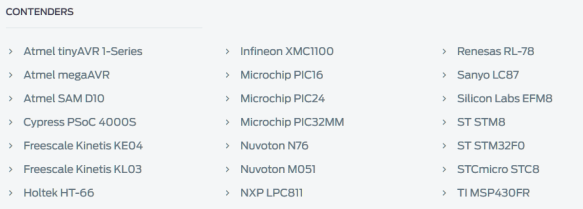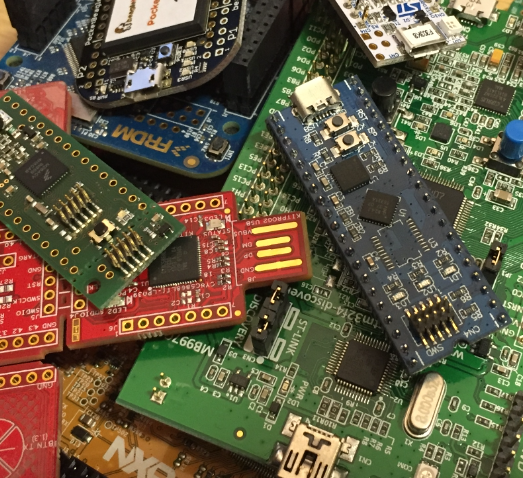I’m using many microcontroller in my projects. And a lot more are available out there in the ecosystem. Like many others, I tend to select what I am familiar with. But is this the correct approach to select the hardware and tools for a next project?
For any new project, it is worthwhile to pause a few minutes and re-consider the hardware and software tools to be used. For me, the capabilities of the hardware are important, but even more important are the software and tools. But what will be the winner for that next project? It all depends on many factors, and it is always good to have an overview.
Jay Carlson has published a series about 21 different micro controllers on https://jaycarlson.net/microcontrollers/ which is an excellent starting point.

Contenders (Source: https://jaycarlson.net/microcontrollers/)
He does not only compare the hardware, he does cover as well the software and tools available. He provides many interesting insights and thoughts about the current ecosystem, and hopefully all these vendors have a read too, as he makes some excellent points.
Jay describes the different microcontroller cores and their peripherals, and he goes into the pros and cons of the software and hardware tools available for all the above microcontroller. And finally he compares the performance with three different benchmarks. A few of his points might be debatable, but this is the most comprehensive overview I have ever seen. It takes a while to go through the massive amount of information, but if you ever consider choosing a microcontroller plus the software and tools for your next project, it is a very worthwhile read. It might be that there is something better out there you are not aware of :-).
Happy Exploring 🙂
Links
- The amazing $1 Microcontroller (by Jay Carlson): https://jaycarlson.net/microcontrollers/


Amazing write-up Jay has done; lots of MCU options out there below $1. But, don’t forget the extreme amount of time and aggravation it can take to sort through a new chip and toolchain’s quirks – a great reason for your approach of sticking with what you know! And, unless production volumes for your new gadget are *really* high, a slightly more expensive and capable part will be much less expensive if it saves a bit of (very expensive and dear) engineering time. A few bucks part can save a huge amount of effort and some are available with low pin-count and low power consumption. A more expensive MCU will also be less expensive in aggregate if it includes one or more parts you’d otherwise need to have external (ADC, DAC, etc).
Thanks Erich,
Best Regards, Dave
LikeLiked by 1 person
Hi Dave,
yes, an amazing write-up, indeed. I agree on the <$1 thing. Most of my projects are low volume (less than a few hundred boards), so choosing a more expensive microcontroller with more FLASH and RAM is usually a plus, as it saves development time and the firmware can be easily extended with new features later on. Or just that it has enough leg room for adding trace and profiling for better validation and verification.
LikeLike
Availability is another important concern. My son’s startup company, which buys on the order of 10,000 processors a year often runs into trouble with a crucial part not being available in the quantity they need, or going up dramatically in price because of short supply. They aren’t big enough to deal directly with the manufacturers, but are just big enough that they can’t count on the distributors having what they need when they need it. They also have very low markups, so a 25¢ difference on a part is huge concern.
LikeLike
Yes, you raise an excellent and valid point. These days we have lots of issues to get parts, even some SMD resistors are out of stock! It gets worse with certain microcontrollers too. We wanted to build another batch using a microcontroller, and it seems it takes late into 2018 until it is back in stock? That’s a reason to design out a manufacturer and use another one.
LikeLike
I think we found out why the accelerometer my son’s company uses has suddenly tripled in price—it is the one that the Microbit uses, so supply dried up very fast. He’s considering a redesign around a different accelerometer—it is too bad that the pinouts are all different, so that simple replacement on the same board is not possible.
LikeLike
It seems that many silicon devices are on short supply. I faced that situation recently on many fronts, and there is an interesting discussion on this subject too: https://community.nxp.com/message/973079
LikeLike